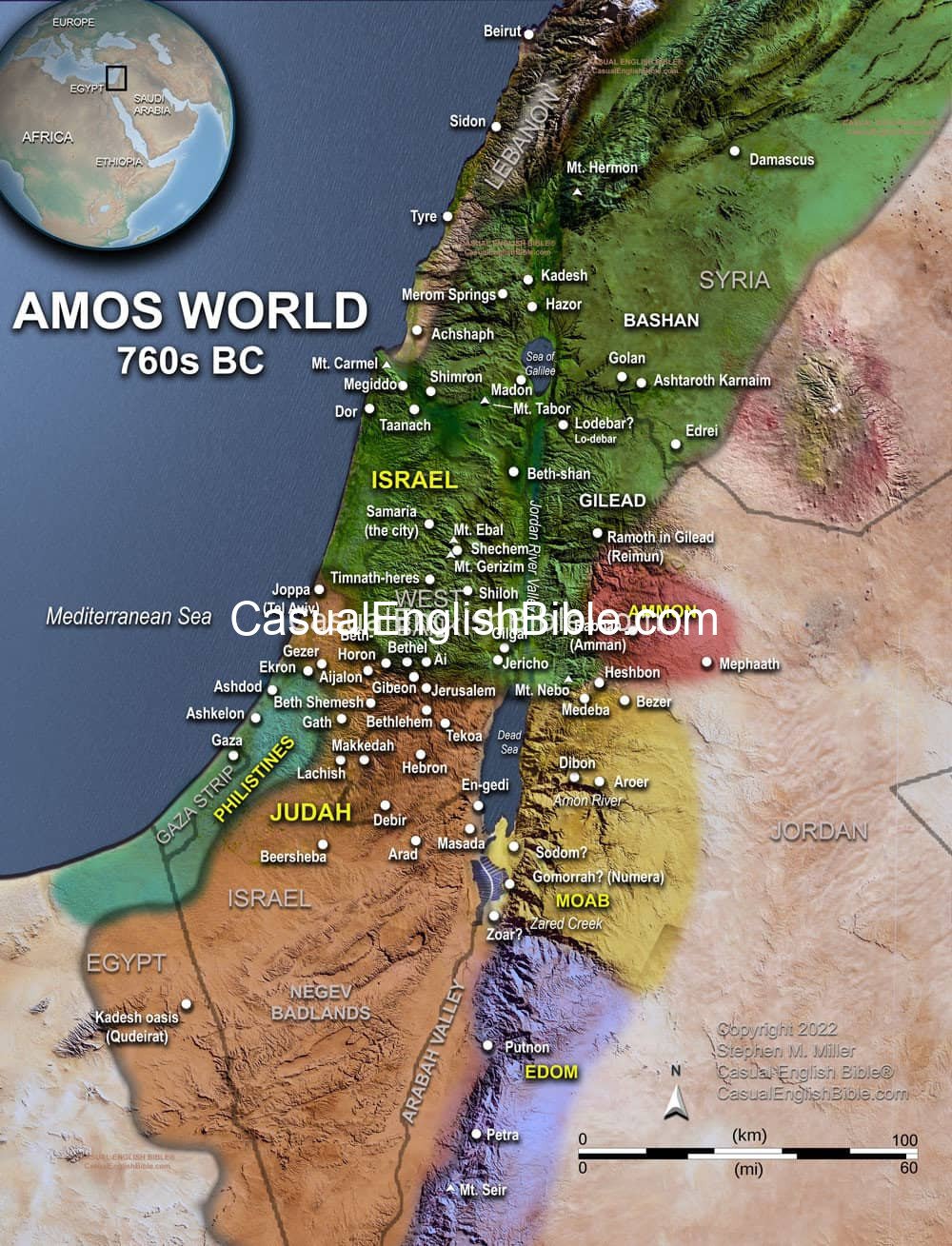Amos 8
God will scatter the Jews into exile
Sobbing in the temples
1The LORD, in a vision, showed me a basket of summer fruit picked at the end [1] of harvest.2He said, “Amos, what do you see here?” I said, “Well, it’s a basket of summer fruit from the end of harvesttime.” Then the LORD said,
It’s the end of Israel.
I won’t delay punishment any longer.
3They won’t be singing in their temples anymore.
They’ll be sobbing.
Everywhere they look they’ll see dead bodies.
It’s a somber scene, so be quiet.
How to cheat the poor
4Listen to me, you people who cheat the poor,Targeting them wherever you can find them
And destroying their lives.
5You can’t wait to rob them.
You say, “When will this new moon festival ever end?
I want to sell some grain.”
Or you say, “I wish the Sabbath would end
I’ve got wheat I need to sell.
And I’ve figured out how to make more money.
I’ll use a smaller measuring cup
For the grain I sell.
And I’ll use heavier weights
To measure what customers pay.
Less wheat for them.
More coins for me.”
6With the money we make
We’ll buy the poor as our slaves
For the price of a pair of cheap sandals.
For a little extra profit, we’ll add to the wheat
Some grain dust we sweep off the ground.
God gets angry at Israel
7The LORD makes this promise,And vows on the name of Jacob [2] to keep it:
“I will never forget what these people have done.
8The ground will quake
And everyone on it will mourn for their dead.
At times you’ll surge and rise like the Nile, [3]
Then you’ll sink like the Nile does, too.
9When that day comes, says the LORD God,
I’ll make the sun go dark by noontime.
In daylight you’ll see nothing but darkness.
10I’ll turn your parties to funerals,
Your songs to the blues,
Your dress clothes to feed sacks
And your hair to bald heads.
You’ll mourn like you lost your only son
At the end of a bitter day.
When Jews scatter and search for God
11The time is coming when I’ll send famine,But not like any before.
You won’t hunger for food
Or thirst for water.
But you’ll hunger to hear the words of the LORD. [4]
12You’ll scatter and wander from sea to sea
You zigzag north to east and south to west
Hoping to hear from the LORD.
But you’ll never find what you want.
13When that day comes,
Strong young men and beautiful women
Will collapse of thirst and fall.
14Some of you will shame yourselves
By swearing devotion to Samaria’s god, [5]
Or to the god at the shrine in Dan,
Or to the religious power in Beersheba.
But those who do will die
And they’ll never rise again.
Footnotes
Amos sees a basket of summer fruit. The paraphrase adds “picked at the end of harvest” to help show the wordplay Amos used. In ancient Hebrew, the word for “summer fruit” is קַיִץ, pronounced qayis. It sounds a bit like one of the Hebrew words for “end,” קֵץ, pronounced kates. The point of the visual focuses on the word “end.” It’s the end of harvest. It’s the end of Israel. After Assyria is finished with the northern Jewish nation, in 722 BC, the scattered and exiled Jews will become known as the Lost Tribes of Israel. They never return to rebuild their nation, unlike Judah after Babylon erases them from the world map in 586 BC. Jews of Judah start returning 50 years later, after Persians defeat Babylon and frees the captives.
God vows, more literally, “by the pride of Jacob.” It’s unclear what that means. “Jacob,” the father of the 12 tribes of Israel—might refer to his descendants. Or it could refer to the arrogance of the nation. They were in their glory days, and they couldn’t seem to imagine Amos’s prophecy coming true. They couldn’t see their nation of Israel disappearing. Another possible way of saying it, “As sure as the arrogance of Israel, I’ll never forget what they’ve done.”
It’s unclear what the rising and sinking of the Nile River illustrates. One guess among Bible scholars is that it illustrates the power of God. He controls the mighty Nile River. He can send floods that irrigate the land each autumn and winter. But he can raise it high enough to devastate Egypt’s farmland. And he can withhold the water, which can dry up the crops. This powerful God is going to use his power against Israel. Or perhaps the imagery is of God letting Israel rise in power and influence one day but sink and then fall to invaders later.
The “words of the LORD” may refer to the Laws of Moses and to messages that prophets delivered for God. Jews in exile had no temples where they could worship or priests to advise them. And there were few prophets with messages from God. After the exile, there was a long stretch of several centuries with no notable prophets. John the Baptist would break the prophecy drought in the first century, some 400 years after the last Jewish nation died, in 586 BC. That was when Babylon conquered Judah. Israel had fallen earlier, to Assyria in 722 BC.
More literally, “swear by Samaria’s shame.” But scholars have to guess what that means. It could refer to worshiping the Baal and Asherah idols, mentioned in 1 Kings 16:32-33. In Dan, Israelites worshiped an idol (Judges 18:30). And some scholars speculate that the northern Israelites of Israel made the pilgrimage to Beersheba to visit a shrine honoring some distorted view of Israel’s God and teachings.
Discussion Questions
- Sorry, there are currently no questions for this chapter.











